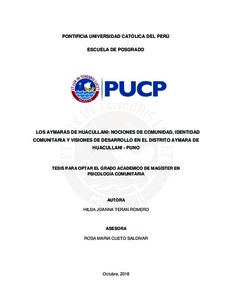| dc.contributor.advisor | Cueto Saldívar, Rosa María Luisa Martina | |
| dc.contributor.author | Teran Romero, Hilda Joanna | es_ES |
| dc.date.accessioned | 2019-05-02T21:04:58Z | es_ES |
| dc.date.available | 2019-05-02T21:04:58Z | es_ES |
| dc.date.created | 2018 | es_ES |
| dc.date.issued | 2019-05-02 | es_ES |
| dc.identifier.uri | http://hdl.handle.net/20.500.12404/14101 | |
| dc.description.abstract | La presente investigación tuvo como objetivo analizar las nociones de comunidad, identidad
comunitaria y visiones de desarrollo de un grupo de pobladores del distrito aymara de Huacullani
en el departamento de Puno. La investigación corresponde a un enfoque cualitativo y a un diseño
fenomenológico en el cual participaron 20 personas de edades entre 18 y 70 años que se
identificaron como pobladores del distrito de Huacullani. Para ello, se utilizó como técnica de
recolección de datos la entrevista semiestructurada. Los resultados encontrados hacen referencia a
que la identidad comunitaria de los pobladores de este distrito está conformada a partir de
características propias del Pueblo Aymara; la colectividad y la organización. Asimismo, los
pobladores describen múltiples nociones de comunidad, siendo la más cercana al constructo de
comunidad desde la psicología comunitaria el de comunidad como Estado Nación Aymara.
Finalmente, las visiones de desarrollo de los pobladores hicieron alusión al enfoque de desarrollo
comunitario, al enfoque de desarrollo sostenible y al concepto de buen vivir; siendo el principal
impedimento para el desarrollo la minería y el accionar del Estado. | es_ES |
| dc.description.abstract | The aim of this research was to analyze the notions of community, community identity and
development visions of a group of residents of the Aymara district of Huacullani in the department
of Puno. The research corresponds to a qualitative approach and to a phenomenological design in
which 20 people between the ages of 18 and 70 who identified themselves as inhabitants of the
Huacullani district participated. For this, the semistructured interview was used as a data collection
technique. The results found refer to the fact that the community identity of the inhabitants of this
district is based on the characteristics of the Aymara Nation; the community and the organization.
Also, the villagers describe multiple notions of community, being the closest to the community
construct from the community psychology community as Aymara Nation State. Finally, the
development visions of the villagers alluded to the community development approach, the
sustainable development approach and the good living concept; being the main impediment to the
development of mining and the actions of the state. | es_ES |
| dc.description.uri | Tesis | es_ES |
| dc.language.iso | spa | es_ES |
| dc.publisher | Pontificia Universidad Católica del Perú | es_ES |
| dc.rights | info:eu-repo/semantics/openAccess | es_ES |
| dc.rights.uri | http://creativecommons.org/licenses/by/2.5/pe/ | * |
| dc.subject | Comunidades | es_ES |
| dc.subject | Pueblos indígenas--Perú | es_ES |
| dc.subject | Aymaras--Condiciones sociales | es_ES |
| dc.subject | Identidad cultural--Perú--Huacullani (Puno : Distrito) | es_ES |
| dc.title | Los aymaras de Huacullani: nociones de comunidad, identidad comunitaria y visiones de desarrollo en el distrito aymara de Huacullani - Puno | es_ES |
| dc.type | info:eu-repo/semantics/masterThesis | es_ES |
| thesis.degree.name | Maestro en Psicología Comunitaria | es_ES |
| thesis.degree.level | Maestría | es_ES |
| thesis.degree.grantor | Pontificia Universidad Católica del Perú. Escuela de Posgrado | es_ES |
| thesis.degree.discipline | Psicología Comunitaria | es_ES |
| renati.advisor.dni | 07886899 | |
| renati.advisor.orcid | https://orcid.org/0000-0003-3549-2001 | es_ES |
| renati.discipline | 313287 | es_ES |
| renati.level | https://purl.org/pe-repo/renati/level#maestro | es_ES |
| renati.type | http://purl.org/pe-repo/renati/type#tesis | es_ES |
| dc.publisher.country | PE | es_ES |
| dc.subject.ocde | https://purl.org/pe-repo/ocde/ford#5.01.00 | es_ES |






